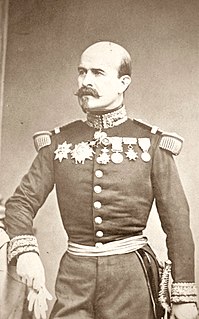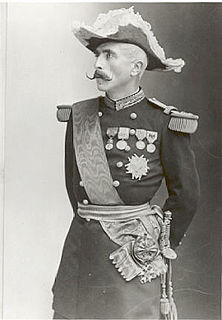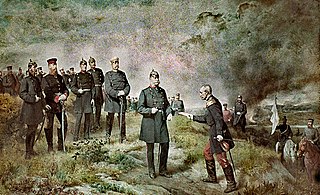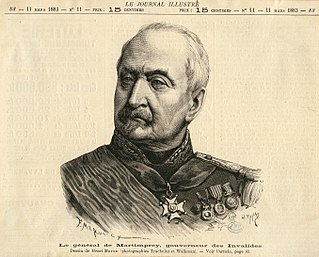
Louis-Jules Trochu was a French military leader and politician. He served as President of the Government of National Defense—France's de facto head of state—from 4 September 1870 until his resignation on 22 January 1871.

François Achille Bazaine was an officer of the French army. Rising from the ranks, during four decades of distinguished service under Louis-Philippe and then Napoleon III, he held every rank in the army from Fusilier to Marshal of France. He became renowned for his determination to lead from the front, for his impassive bearing under fire and for personal bravery verging on the foolhardy, which resulted in him being wounded on numerous occasions and having his horse shot from under him twice. From 1863 he was a Marshal of France, and it was in this role that he surrendered the last organized French army to Prussia during the Franco-Prussian war, during the siege of Metz.

Edmond Leboeuf was a marshal of France. He joined the Frecnh army as an artillery officer. He fought in Algeria, the Crimean War (1853–1856) and the Italian War of 1859. In 1869 he became minister of war and in the spring of the next year was promoted to Marshal of France. He fought in the Franco-Prussian War (1870) being taken prisoner when Metz garrison surrendered to the Prussians. On his return to France, after the end of hostilities, he gave evidence to a commission into the surrender of Metz, and then retired into private life.

Gaston Alexandre Auguste, Marquis de Galliffet, Prince de Martigues, was a French general, best known for having taken part in the repression of the 1871 Paris Commune. He was Minister of War in Waldeck-Rousseau's cabinet at the turn of the century, which caused a controversy in the socialist movement, since independent socialist Alexandre Millerand also took part in the same government, and was thus side by side with the Fusilleur de la Commune.

Rank insignia in the French Army are worn on the sleeve or on shoulder marks of uniforms, and range up to the highest rank of Marshal of France, a state honour denoted with a seven-star insignia that was last conferred posthumously on Marie Pierre Koenig in 1984.

The Tonkin Expeditionary Corps was an important French military command based in northern Vietnam (Tonkin) from June 1883 to April 1886. The expeditionary corps fought the Tonkin Campaign (1883–86) taking part in campaigns against the Black Flag Army and the Chinese Yunnan and Guangxi Armies during the Sino-French War and the period of undeclared hostilities that preceded it, and in important operations against Vietnamese guerrilla bands during the subsequent 'Pacification of Tonkin'.

Bruno Dary is a Général d'armée of the French Army and Commandant of the French Foreign Legion.

Sylvain-François Jules Merle de la Brugière, comte de Laveaucoupet was a French general.

Viscount Armand-Octave-Marie d'Allonville was a French general of division which distinguished himself during the French conquest of Algeria and the Crimean War. He was later appointed senator.

Jakob Freiherr von Hartmann was a Bavarian general who served in the Austro-Prussian War and Franco-Prussian War.

The Army de Châlons was a French military formation that fought during the Franco-Prussian War of 1870. Formed in the camp of Châlons on August 17, 1870 from elements of the Army of the Rhin (1870) which the formation was issued from, the Army of Châlons was engaged in combats of Beaumont and Sedan while disappearing during the capitulation of September 2, 1870.

André Charles Victor Reille was a French general. Born into a military family, he studied at the Military School of Saint-Cyr and was a cavalry lieutenant by 1838, captain in 1841, before becoming an aide to General Oudinot, squadron leader in 1851, Lieutenant-Colonel in 1855, colonel in 1859, brigadier general in 1865, and major general in 1875. He was an aide to Napoleon III beginning in 1859 and gave Napoleon's letter of surrender to King William of Prussia at the Battle of Sedan in 1870.

Paul Lardry was a Général d'armée of the French Army who served almost an entire career and Commandant of the French Foreign Legion.

Christophe de Saint Chamas is a Général de corps d'armée of the French Army and Commandant of the French Foreign Legion.

Jean-Louis Franceschi is a Général of the French Army and Commandant of the French Foreign Legion.

Bernard Grail is a Général of the French Army and a former Commandant of the French Foreign Legion (COMLE).

François Gérard Marie Lecointre is a French army general serving as Chief of the Defence Staff since 20 July 2017. With lieutenant Bruno Heluin, and as a captain, he was one of the two section chiefs heroes of the Bridge Battle in 1995, the last Fixed Bayonet Charge combat of the French Armed Forces.
Rank insignia in the French air force are worn on the sleeve or on shoulder marks of uniforms
Major in France, is a senior superior military rank across various military and security institutions with history dating back well beyond the 18th century.

Count Edmond-Charles de Martimprey was a French soldier, briefly Governor General of Algeria, and then Senator of France for the remainder of the Second French Empire.




















